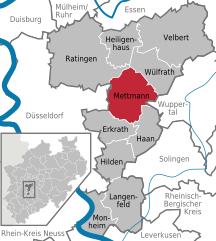Mettmann, Germany
| Mettmann | ||
|---|---|---|
|
||
| Coordinates: 51°15′N 6°58′E / 51.250°N 6.967°ECoordinates: 51°15′N 6°58′E / 51.250°N 6.967°E | ||
| Country | Germany | |
| State | North Rhine-Westphalia | |
| Admin. region | Düsseldorf | |
| District | Mettmann | |
| Government | ||
| • Mayor | Bernd Günther | |
| Area | ||
| • Total | 42.52 km2 (16.42 sq mi) | |
| Elevation | 125 m (410 ft) | |
| Population (2015-12-31) | ||
| • Total | 38,291 | |
| • Density | 900/km2 (2,300/sq mi) | |
| Time zone | CET/CEST (UTC+1/+2) | |
| Postal codes | 40822 | |
| Dialling codes | 02104 | |
| Vehicle registration | ME | |
| Website | www.mettmann.de | |
Mettmann is a Rhenish town in North Rhine-Westphalia, Germany. It is the administrative centre of the district of Mettmann, Germany's most densely populated rural district. The town lies east of Düsseldorf and west of Wuppertal.
Located on the ancient trade route "strata coloniensis" the Lotharingian hamlet of Medamana (engl. between the streams, which bears an etymological similarity to the origins of the name for the Northern Italian city of Milan (lat. Mediolanum)) first appeared in the charter of the last Carolingian King, Louis the Child, 904 AD, thus existing "officially" for more than 1100 years.
In 1363 Mettmann was one of eight administrative burghs in the Earldom of Berg and Jülich. Later the burgh became independent at the hand of Counsellor to the Earl of Cleves and was allowed to build a wall and choose a mayor. The ability to toll and tax allowed the burgh to develop in commerce and trade.
In 1806 Mettmann became a part of the Grand Duchy of Berg under the rule of Napoleon's brother-in-law, Joachim Murat. During this time, Mettmann's burgomaster was called "." Mettmann remained French for about 10 years and became a part of Prussia's Province of Jülich-Cleves-Berg following Napoleon's defeat at the Battle of Leipzig in 1813. As the result of the Congress of Vienna (1814–15), in 1822 it was adsorbed into the Prussian Rhine Province.
...
Wikipedia




